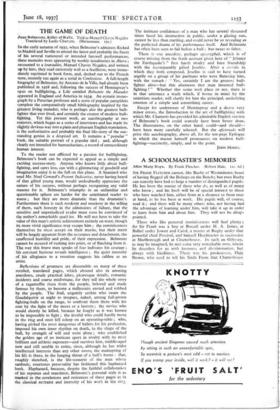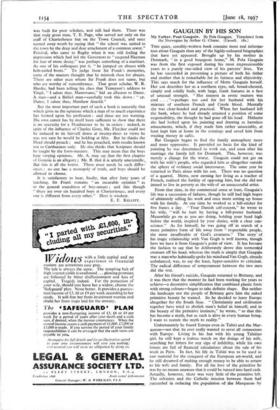A SCHOOLMASTER'S MEMORIES
After Many Days. By Frank Fletcher. (Robert Hale. 12s. 6d.) SIR FRANK FLETCHER cannot, like Busby of Westminster, boast of having flogged all the Bishops on the Bench; but even Busby can scarcely have had so large a number of distinguished pupils. He has been the master of those who do, as well as of many who know ; and his book will be of special interest to those who have watched him, either from at a distance or from near at hand, as he has been at work. His pupils will, of course, read it ; and there will be many others who, nor having had the advantage of learning under him, will take it up in order to learn from him and about him. They will not be disap- pointed.
Those who was personal reminiscences will find plenty ; for Sir Frank was a boy. at Rossall under H. A. James, at Balliol under Jowett and Caird, a master at Rugby under that powerful chief Percival, and hiniself Headmaster in succession at Marlborough and at Charterhouse. In such an Odyssey, as may be imagined, he met some very remarkable men, whom he describes for us with keenness and discrimination, but always with kindliness. There was his predecessor, Haig Brown,. who used to tell his Sixth Form that Charterhonse
was built for poor scholars, and still had them. There was that truly great man, T. E. Page, who served not only on the staff of Charterhouse but- on the Town Council, and once
turned away wrath by saying that " the school was united to the town by the deep and dear attachment of a common sewer."
Percival, who came to Rugby when it was still feeling the depression which had led the Governors to "suspend Hayman for fear of more decay," was perhaps something of a martinet.
As one of his colleagues put it, " he jumped on abuses with
hob-nailed boots." To judge from Sir Frank's memories, some of the masters thought that he mistook them for abuses.
There are other men whom Sir Frank does not name, but who are worthy of remembrance. That great scholar, W. R. Hardie, had been telling his class that Tennyson's address to Virgil, " I salute thee, Mantovano," hid an allusion to Dante. A man—and a Balliol man—carefully took this down : " cp. Dante, I salute thee, Matthew Arnold."
- But the most important part of such a book is naturally that which gives us the opinions which a man of so much experience has formed upon his profession : and these are not wanting.
His own career has by itself been sufficient to show that there is no necessity for a Headmaster to be in orders : indeed, in
spite of the influence of Charles Gore, Mr. Fletcher could not be induced to tie himself down at twenty-three to views he was not sure he would be holding at fifty. But he thinks the Head should preach ; and he has preached, with results known not to Carthusians only. He also thinks that Scripture should be taught by the form-masters. This may mean that the boys hear varying opinions. Mr. A. may say that the first chapter of Genesis is an allegory ; Mr. B. that it is utterly unscientific, But this is all the better. There must needs be such differ- ences ; no one has a monopoly of truth, and boys should be allowed to choose.
It is satisfactory to hear, finally, that after forty years of teaching, Sir Frank remains " an incurable optimist " as to the general soundness of boy-nature ; and this though " there are over six hundred boys at Charterhouse, and every one is different from every other." Here is wisdom.
E. E KELLETT.















































 Previous page
Previous page